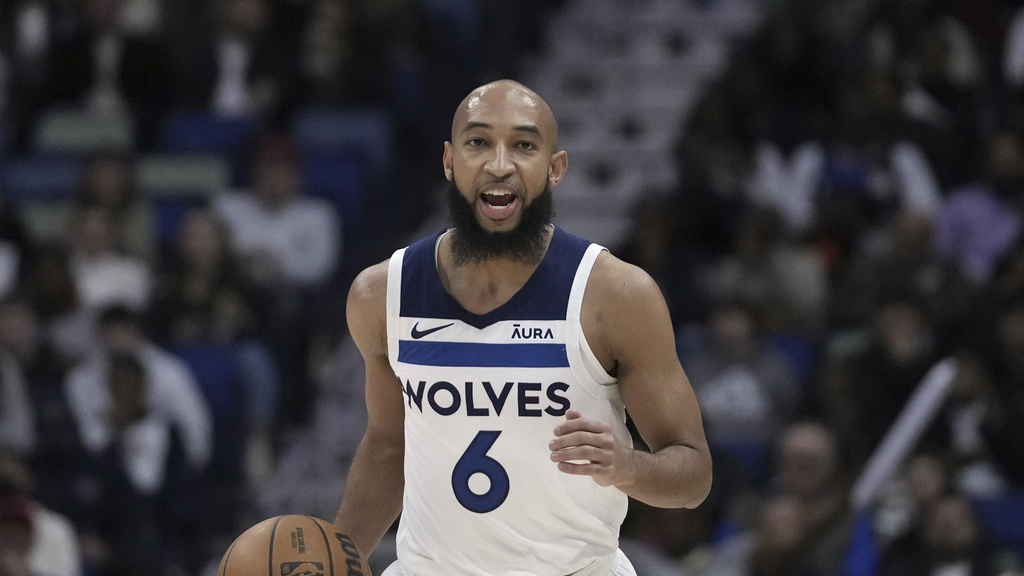
For Timberwolves, it’s Jordan McLaughlin time
Rudy Gobert couldn’t help but smile as soon as Jordan McLaughlin’s name was brought up in a question Tuesday at the team’s practice facility.
This is Gobert’s second season playing with the reserve guard. But after injuries plagued McLaughlin for much of last season, only now is the center getting a true taste of the McLaughlin effect.
Never more was that evident than Monday in New York, when McLaughlin was inserted in the third quarter of a game in which the Wolves trailed by 21, and immediately ignited a rally that pulled the Wolves to within four.
In 12 minutes, McLaughlin finished with nine points, three assists, two steals and a rebound, and was a plus-13.
“Anytime you get an opportunity to be out there on the floor is great. Glad I was able to make an impact for the team,” McLaughlin said. “Unfortunately, we didn’t come out with the win, but it gave us a shot to win.”
And Gobert was clearly loving it. He has a clear sense of what the backup floor general brings to the team whenever he’s deployed.
“Toughness, unselfishness, pace — all the things we need,” Gobert said. “And sometimes when we get in a rougher stretch or a stretch where we don’t play as well, we kinda lose that a little bit. It felt like a breath of fresh air to have him (Monday) on the floor. Just doing all the little things — loose balls, all the little stuff that helps winning.”
It always has. The Timberwolves have consistently been a better team in recent years with McLaughlin on the floor. This season, they’re outscoring opponents by 8.1 points per 100 possessions when he’s in action. Those stints, though, have been short and sweet. That’s partially due to the month of time McLaughlin missed with a knee injury. But even before and after that absence, his minutes have been sporadic and limited.
Finch noted after the Knicks game that as the night progressed, it “felt like a J-Mac game.” That’s been the guard’s usage at the moment. Frankly, when the Wolves don’t move the ball or simply don’t play with much energy, McLaughlin has been inserted as a spark plug. And, when the team is properly ignited, he heads back to the bench.
But that may no longer be the case.
“I think honestly J-Mac is getting to the point where he’s going to grab the (final rotational) spot, and we’ll see what he can do,” Finch said.
That spot has oscillated between Troy Brown Jr. and Shake Milton through the first third of the season. And Finch noted those two players — along with McLaughlin — have varying skillsets that could prove advantageous for Minnesota to utilize in any given situation or matchup. The Wolves plan on maintaining that flexibility.
But, for now, when Minnesota is struggling to generate ball movement and high IQ offense in general, McLaughlin is an easy antidote for what ails the Wolves offensively.
“He makes the system go. He does all the things we know J-Mac can do, and we thought, and still believe at times, that both Shake and Troy can give us other dimensions. Yeah, sometimes you’ve just got to cycle through that stuff,” Finch said. “I can’t expect Troy Brown to make threes at a high level if the ball doesn’t move. I can’t expect Shake to be good in transition if we’re not getting out and running. So there’s no doubt about it, those guys have been the victim of some really kind of poor offense at times. But J-Mac obviously has the ability — more than those guys — to generate more good offense in the beginning.”
As McLaughlin so prophetically tweeted following Monday’s game, it is indeed the “Return of the Mac.”
Related Articles
Timberwolves beat on glass in loss to Knicks
Jace Frederick: After nearly costing Timberwolves a game, it’s time for Jaden McDaniels to mature
A game of millimeters: Timberwolves top Lakers in thriller after LeBron James’ late shot ruled a two
Lakers are flush with Timberwolves of old
How can the Timberwolves’ offense improve? It starts with the decision-making of their two top scorers


